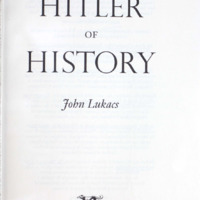-
Title
-
The Hitler of history.
-
Description
-
Since 1945 there have been more than one hundred biographies of Hitler, and countless other books on him and the Third Reich. What happens when so many people reinterpret the life of a single individual? Dangerously, the cumulative portrait that begins to emerge can suggest the face of a mythic antihero whose crimes and errors blur behind an aura of power and conquest. By reversing the process, by making Hitler's biographers - rather than Hitler himself - the subject of inquiry, Lukacs reveals the contradictions that take us back to the true Hitler of history. Like an attorney, Lukacs puts the biographies on trial. He gives a masterly account of all the major works and of the personalities, methods, and careers of the biographers (one cannot separate the historian from his history, particularly in this arena); he looks at what is still not known (and probably never will be) about Hitler; he considers various crucial aspects of the real Hitler; and he shows how different biographers have either advanced our understanding or gone off track.
-
Identifier
-
2500181
-
679446494
-
Creator
-
Lukacs, John
-
Format
-
1st ed.
-
Source
-
Brian Lamb Booknotes Collection
-
Gift of Brian Lamb, 2011.
-
Catalog record
-
Language
-
eng
-
Date
-
1997
-
Program air date: March 1, 1998
-
Publisher
-
A.A. Knopf
-
George Mason University. Libraries. Special Collections & Archives
-
Text
-
Transcription of Annotations
Notes on front endpapers, flysheet, and half-title: David Irving--his attempt to rehabilitate Hitler-John Keegan endorse Toland. Both parents died before 19 yr old. Loneliness, secretiveness, didn't want things written down. Close to his photographer, a man of the spoken word. His obsession with the Jews; his racism. His remarkable little interest in Lit. Thigh slapper--moments of satisfaction. Parkinson's Disease--last 9 months. Hated his father. Broken with grief at death of Mother. Extraordinary memory. Ex-Catholic. Disdain for economics. No pilots with glasses (48). His large triangular nose. He was an atheist. He believed in God. Hitler was not a sadist. Historicization--p 11, what is it? Jan. 16. You emphasize several times--this is not a biography of Hitler. What were Hitler's table conversations- Hitler's duality-what was it? Mein Kampf. What questions about Hitler are still open. Lukacs--the choice of every word in a moral one p 37. What is the difference between Biography and History. Hitler was not mad--he was a normal human being p 43. "He may have been the most popular revolutionary leader in the history of the modern world" p 50. Vienna most fundamental schooling of his life. Important turning point in Munich, 1919. His duality, his hate--learned to hate. Rose late/ate late. Faster reader of books/astonishing memory. Strong power of concentration. Hitler-never been to a university. Churchill's assessment of Hitler p 61 footnote. Anti-Jewish came at 31 Munich/Vienna. 4 Turning Points: 1. Coming to Vienna 1908; 2. Return to Munich 1919; 3. Released from prison in Munich, 1924; 4. His health--he believed he had little time left. Reactionary or Revolutionary. Saw Der Konig (1923) 17 times in 3 years. His anti-Communism, emphasis on Nationalism. He wanted to maintain churches-support from Catholics. He was a populist. From 1932-1939 (were successful years)survey years; marriage rates high, suicides low. (Became chancellor Jan. 1933). His duality--Leader and artist-architect. Autobahns, U-Bahn, motherland. He had occasional sentiments of inferiority; what did he hate in himself. Hitler came close to winning his war p 129 (1940-1941). 1939 Hitler marches into Czechoslovakia. His Lebensraum folly. (149) Main enemy is still Britain. Joachim Fest--"great" biography 1973 (best long bio 1,184 pages); William Shirer's "superficial" Rise and Fall; Konrad Heiders--first study of Hitler 1936 (Zurich); Alan Bullock--most successful of all Hitler Bios; AJP Taylor-English-self confident maverick (wrong p 162); Percy Ernest Schram-first rate German Hist-able to observe H. first hand; Werner Maser-East Prussian turned American-unearthed large quantities of data; Andreas Hillgruber-most prominent German specialist in the History of WWII and of Hitler--200 word sentences. Eberhard Jackel--Hitler's ideology. Ernest Deuerlein--best short Hitler biography, best one book for students. John Toland--250 interviews--worshipers and deriders indications of his admiration for Hitler detectable throughout the book. David Irving--unrepentant admirer of Hitler (1977). Ernest Nolte-German [F]acism must be understood as a reaction to Russian Bolshevism. Rainer Zitelmann--Hitler as a politician. 20 Ja. 42--Had he planned elimination of Jews from beginning, was there a single killing order. Aug/Sept-Hitler ordered Final Solution. Jews responsible for the war. Mass murder of 4.5 million Jews (Yellow stars). Word: Holocaust didn't appear until 1960. Tocqueville--9 pages 77/111-112/119/204/208/247/249/268. Hitler was interested in things American from his youth. Read Karl May--German writer about American West/Indians. American-he knew victory wasn't possible in 1941. Hitler's overall goals were vague. He admired Stalin-photo-no cigarette in his hand. Who tr[i]ed to poison Hitler. Lukacs--longest chapter--"my view of H. as statesman and strategist." Lamb checks selected section on the Contents pages. Lambs notes/underlinings amplify ideas/information highlighted in Lamb's notes in the front matter.
-
Subject
-
"Hitler, Adolf, 1889-1945."
-
"Heads of state--Germany--Biography."
-
"National socialism."
-
Relation
-
Original Booknotes interview
-
Rights
-
This work may be protected by copyright laws and is provided for educational and research purposes only. Any infringing use may be subject to disciplinary action and/or civil or criminal liability as provided by law. If you believe that you are the rights-holder and object to Mason’s use of this image, please contact speccoll@gmu.edu.
 2500181.pdf
2500181.pdf